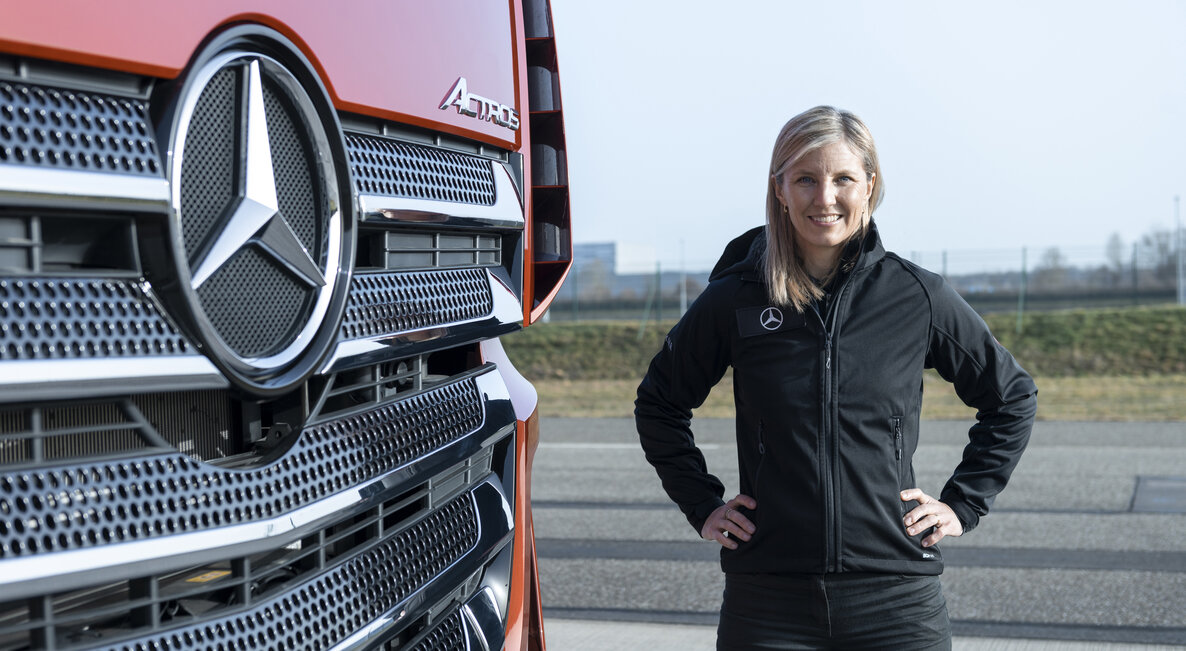Transport decarbonization is just a part of a moment of changes for the company, which shall adequate its operation also in Brazil


Karin Rådström, Vorstandsmitglied Daimler Truck AG und Leiterin Mercedes-Benz Trucks. // Karin Rådström, Member of the Board of Management of Daimler Truck AG and Head of Mercedes-Benz Trucks.
By Décio Costa | Translated by Jorge Meditsch
The presentation of the eActros LongHaul, a 100% electric, 500 km range tractor-trailer at the IAA Transportation 2022, doesn’t leave doubts about the brand’s direction. The model, scheduled for Europe in 2024, is just one of the elements of the picture being drawn.
In an interview with the Brazilian press at the German commercial vehicle exhibition in Hanover, Karin Rådström, Mercedes-Benz Trucks’ CEO, observed that current times are special. At the same time, the manufacturer invests in electrification, including the hydrogen cell, there are discussions about the Euro 7 regulations forecasted for 2025, and she also remembers the transition in Brazil to the Proconve P8 from January 2023.
We have the advantage of being the world’s largest truck manufacturer, so we need to look for synergies from all sources. Regarding batteries, we are aligned with our colleagues in the United States, so what will be used in the eActros may also be used in the eCascadia, for instance. And, looking to Brazil, our zero-emission products are also beginning to be developed.”
Nonetheless, the executive emphasized that the current situation is unusual, especially considering parts and components supply. Karin does not see supply stability in the next years, as the industry was used to.
“The positive about this is that we learned to deal with the challenge and plan shorter cycles. We currently prioritize building the truck, even if we don’t have all parts. We complement it afterward, when they become available.
In a picture already pointing to electrification in a scenario of components shortage, Mercedes-Benz is adding changes to its business models. In Brazil, especially, the company is preparing a restructuration, as already announced, which will affect at least 3.6 thousand workers due to operations outsourcing.
According to the CEO, the Brazilian truck market is important, currently Mercedes-Benz’s world’s largest, and shall remain like that in the future. Over the last ten years, nonetheless, various plans were applied to improve the company’s performance without achieving the desired results.
“Brazilian market is very cyclic, sometimes very high, sometimes very low. We want to be ready. This is the reason why we made the announcement. The plan to outsource is just a part of the business transformation. It has not to do with our commitment to the region.”
For Achim Puchert, president of Mercedes-Benz Truck and Bus in Brazil, the company prepares the plant for the future. At the same time, it works developing new products, it is looking for new income source opportunities, such as new business models and financial services.
“Our customers want an agile vehicle and services supplier, with a competitive cost basis. The items focused on the change are related to logistics, therefore are not our main activities, which we consider necessary to be well-succeeded to provide innovative technological solutions”, resumed Puchert.
Photograph: Mercedes-Benz
Unidade paranaense responsável por rolamentos de rodas terá aumento entre 15% e 20% até o…
Fabricante atua no mercado de reposição e no OEM com fornecimento da Argentina
85% dos produtos que vende localmente são provenientes da China
Sem revelar nomes, diretor-presidente informa serem duas montadoras interessadas no OBC e no Inverter
Durante solenidade de abertura da Automec 2025, ministro do MDIC reafirmou também o IPI Verde
Sedã compacto ganhou melhorias internas e nova dianteira